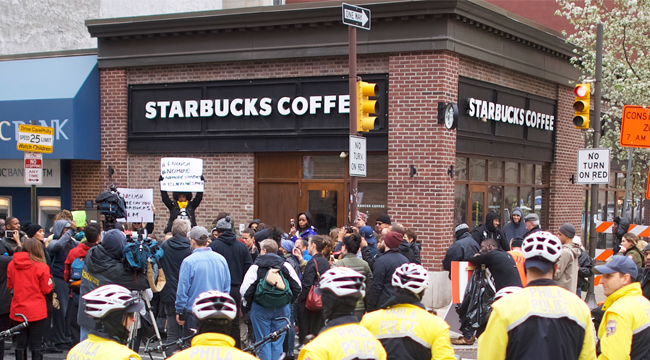
After footage of two black men being arrested (seemingly for no reason) in a Philadelphia Starbucks went viral on Saturday, the rest of the weekend saw Starbucks issue a series of apologies. Although CEO Kevin Johnson stated his intent to apologize “face-to-face” to the two men, and the manager who called the police has left the company in what Starbucks is calling a “mutual decision,” ongoing protests are occurring outside the store, and trouble continues to brew on social media.
As is often the case with controversial incidents surrounding corporate entities, calls for a boycott (with a #BoycottStarbucks hashtag firing up) have grown louder over the past few days. Pop culture figures are joining the cause with T.I. declaring his belief that “we should reserve our right to stop spending our money in places that don’t respect us equally.” This pronouncement arrived not long before civil rights activist Shaun King posted apparently new footage of a black man being denied a Starbucks bathroom code while a while man received the courtesy, yet as the video indicates, neither man had purchased anything.
https://twitter.com/ShaunKing/status/985896896433602565
Likewise, comic and CNN host Kamau Bell is just one of many who are calling for people to support the boycott by redirecting their coffee money to Black-owned coffee shops.
So I don't know about #BoycottStarbucks. I'll check w/ my activists. But support your local cool coffee shops either way. Mine are Aucoquelet, Espresso Roma, & Sack's. & @Calabashtea in DC. Here's a list of Black owned ones. https://t.co/ciSQp6uRXf
— W. Kamau Bell (@wkamaubell) April 15, 2018
The hashtag is seeing overwhelming support by most who use it.
My dad sits around Starbucks for hours and nobody says a word to him about it.
He's a 69 year old white man, so that might have something to do with it.#BoycottStarbucks
— Ted Corcoran (RedTRaccoon) (@RedTRaccoon) April 15, 2018
There were two eye witnesses, a woman making a video, and a guy in the video all sharing the same story…
Stop saying “You don’t know the whole story…”
You just refuse to believe the one presented. #BoycottStarbucks
— Tony Posnanski (@tonyposnanski) April 15, 2018
When people say there is no race issue in America, I am amazed at their blindness or sheer power of ignorance. #BoycottStarbucks
— Jeeniya (@jeeniya90) April 15, 2018
https://twitter.com/TDPattillo/status/985341308691722240
https://twitter.com/Zynierah/status/985324928638562304
Walking while Black.
Kneeling while Black.
Using a cell phone while Black.
Driving while Black.
And now…waiting in Starbucks while Black.This shit MUST stop.#BoycottStarbucks
— Texas Kenny (@Texaskenny) April 15, 2018
Until 2 black men can sit in a @Starbucks and enjoy a coffee without getting arrested I won’t be going back. Do better Starbucks. #BoycottStarbucks pic.twitter.com/xQJPug9h8b
— Power to the People ☭🕊 (@ProudSocialist) April 15, 2018
https://twitter.com/corpuscollossus/status/985900466574974976
https://twitter.com/Beardactivist/status/985549761657925635
In addition, some folks are remembering a not-really-controversial grumbling about a Starbucks holiday cup in 2016, which set the stage for a boycott that never really took flight.
Conservatives boycott Starbucks because of a fucking holiday cup, but when there's an actual reason to boycott them (RACISM) they make fun of that. #BoycottStarbucks
— Deniz S. (@MrFilmkritik) April 15, 2018
https://twitter.com/Beardactivist/status/985549761657925635
And yet others are treating the situation with humor, or pointing out that the police officers who responded may also be to blame, or stressing that one manager’s decision shouldn’t represent an entire company.
Fuck that. I’m never going to Starbucks again… or any other coffee shop. Actually come to think of it I’m not even going to go into a place and drink coffee anymore… or liquid… even at home. Honestly I’d be surprised if I even ever eat anything again too. #boycottstarbucks
— Chris D'Elia (@chrisdelia) April 15, 2018
Why #BoycottStarbucks when you can #BoycottPolice?
— Charlene A. Carruthers (@CharleneCac) April 16, 2018
Damn, and I really love Starbucks coffee. But now I might get arrested for walking into the shop. #BoycottStarbucks
— Boyce Watkins, PhD – Wealth is Power (@drboycewatkins1) April 16, 2018
One can question the efficacy of boycotts, and indeed, it’s difficult to measure their success as a whole. For example, last year’s advertiser boycott of Fox News Host Bill O’Reilly (after reports of millions of settlement dollars paid to his sexual harassment accusers) was followed by his termination. Whereas a recent advertiser boycott of Laura Ingraham appears to have ended differently, after her offense — although tasteless, given that she mocked a teen shooting survivor — was less egregious than O’Reilly’s.
The difference between the above two examples is much easier to read than the immediate effects of calls for people to stop frequenting Starbucks, and only time will tell if the company can make things right before their bottom line sees measurable effects.
